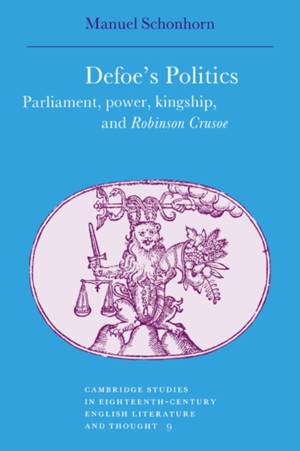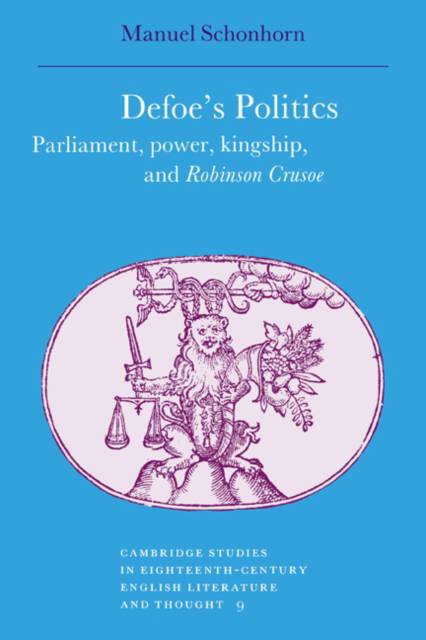
- Afhalen na 1 uur in een winkel met voorraad
- Gratis thuislevering in België vanaf € 30
- Ruim aanbod met 7 miljoen producten
- Afhalen na 1 uur in een winkel met voorraad
- Gratis thuislevering in België vanaf € 30
- Ruim aanbod met 7 miljoen producten
Zoeken
Defoe's Politics
Parliament, Power, Kingship and 'Robinson Crusoe'
Manuel Schonhorn, Schonhorn Manuel
€ 70,95
+ 141 punten
Uitvoering
Omschrijving
This study of Defoe's politics aims to challenge the critical demand to see Defoe as a "modern" and to counter misrepresentations of his political writings by restoring their seventeenth-century context. Offering a full examination of Defoe's years as a political reporter and journalist (1689-1715), it recovers his traditional, conservative and anti-Lockean ideas on contemporary issues: the origins of society, the role of the people in the establishment of a political society and how monarchies are created and maintained as the means of achieving a beneficent political order. At the heart of Defoe's political imagination, Manuel Schonhorn finds the vision of a warrior-king, derived from sources in the Bible, and in ancient and English history. The model illuminates his original reading of Robinson Crusoe, which emerges less in terms of a family romance, a tract for the rising bourgeoisie or a Lockean parable of government, than as a dramatic re-enactment of Defoe's life-long political preoccupations concerning society, government and kingship.
Specificaties
Betrokkenen
- Auteur(s):
- Uitgeverij:
Inhoud
- Aantal bladzijden:
- 192
- Taal:
- Engels
- Reeks:
- Reeksnummer:
- nr. 9
Eigenschappen
- Productcode (EAN):
- 9780521029025
- Verschijningsdatum:
- 2/11/2006
- Uitvoering:
- Paperback
- Formaat:
- Trade paperback (VS)
- Afmetingen:
- 152 mm x 229 mm
- Gewicht:
- 290 g

Alleen bij Standaard Boekhandel
+ 141 punten op je klantenkaart van Standaard Boekhandel
Beoordelingen
We publiceren alleen reviews die voldoen aan de voorwaarden voor reviews. Bekijk onze voorwaarden voor reviews.











